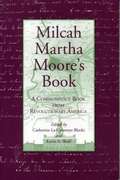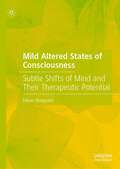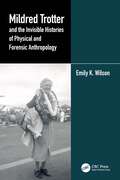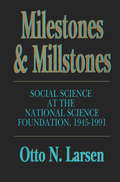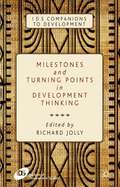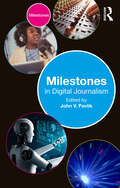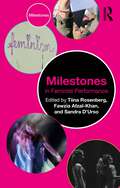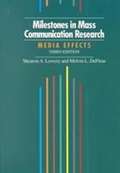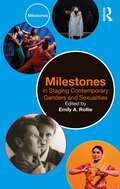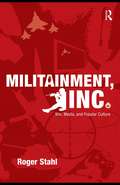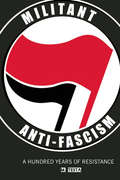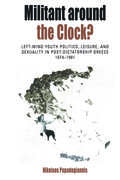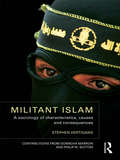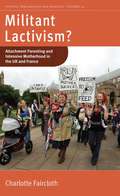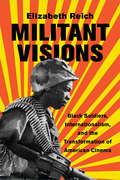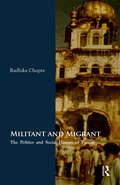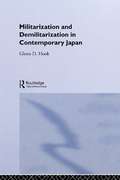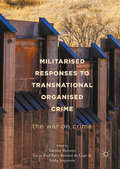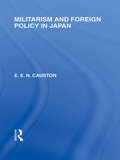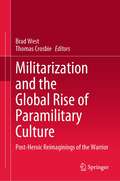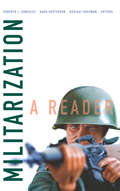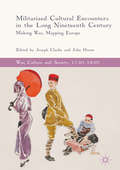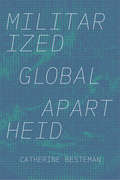- Table View
- List View
Milcah Martha Moore's Book: A Commonplace Book from Revolutionary America
by Catherine La Courreye Blecki Karin A. WulfMilcah Martha Moore lived and flourished in the Philadelphia area during its peak, when it was the center of commerce, politics, social life, and culture in the young republic. A well-educated woman, disowned by her Quaker Meeting for an unauthorized marriage, Moore knew and corresponded with many of the leading lights of her day. From her network of acquaintances, she created a commonplace book, which is published here for the first time. Moore compiled her commonplace book during the American Revolution, carefully selecting works of poetry and prose that she and her friends most enjoyed reading and wanted to remember. <p><p>Contained are 126 works of prose and poetry by at least sixteen different authors, mostly women. Catherine Blecki and Karin Wulf have edited and reproduced the entire collection, adding helpful annotations and interpretive essays that set the collection in historical and literary context. Moore's Book will be a treasure trove for feminist and early American scholars, for it includes two of the most avidly sought-after bodies of writing from British America: sixteen new poems (twenty-four in all) by the Quaker polymath Susanna Wright and a previously lost portion of the journal kept by Elizabeth Graeme Fergusson during her trip to England. There is also a remarkable selection of pieces by Hannah Griffitts, the Quaker moralist and wit who commented on politics, society, and domesticity during the Revolution. Moore also included writings by Benjamin Franklin, Patrick Henry, and Samuel Fothergill. While scholars have speculated about the extent to which elite women exchanged ideas through reading and writing during this period, Moore's Book is the richest surviving body of evidence revealing the nature and substance of women's intellectual community in British America.
Mild Altered States of Consciousness: Subtle Shifts of Mind and Their Therapeutic Potential
by Eileen SheppardThis book draws on transpersonal anthropology and psychology in order to explore mild altered states of consciousness (ASCs) experienced in everyday life. While research into consciousness and particularly ASCs is growing, this book focuses on a neglected area: ‘everyday’ experiences of ASCs. Opening with an up-to-date overview of the development of the study of ASCs, the author presents an in-depth empirical exploration and mapping of mild ASCs. Dr Sheppard examines original research conducted in a range of religious and secular contexts with participants who were engaged in activities including prayer, sport, nature conservation, music and musical instrument making, and TV viewing. The author takes a novel phenomenological approach to the analysis of ASCs, emphasising the subjective experience. The book explores the healing potential of such mild ASCs; the everyday fantasy reality of the interior landscape; and discusses the problem of validity, and belief in the study of ASCs. It will appeal to students and scholars of transpersonal psychology, consciousness studies, social anthropology, and the philosophy of mind.
Mildred Trotter and the Invisible Histories of Physical and Forensic Anthropology
by Emily K. WilsonIn the wake of World War II, anatomist and anthropologist Mildred Trotter left the Midwest for a temporary post as the forensic anthropology expert for the Army in the Territory of Hawaii. Her formidable task was to identify the remains of war dead in order to return them to their families, in a national effort that continues to this day. Mildred Trotter and the Invisible Histories of Physical and Forensic Anthropology is the first, long overdue biography on this woman of immense stature in her field. She was the first woman to serve as President of the American Association of Physical Anthropologists and the first woman to be full professor at the Washington University School of Medicine in St. Louis. While primarily a biography of Trotter, this book also examines aspects that are so often left out of retrospectives of science and scientific figures. This includes scientific error, the historical experiences of the few women and individuals from other marginalized groups active in the discipline, sexism, and scientific and social racism. This book also provides novel historical context regarding her major and now well-known tibia mismeasurement. Mildred Trotter and the Invisible Histories of Physical and Forensic Anthropology is a must-read for anyone interested in the history of science and women in science, and for all practicing and aspiring biological and forensic anthropologists.
Milestones and Millstones: Social Science at the National Science Foundation, 1945-1991
by Otto N. LarsenFrom the 1960s onwards, the clothing industry in the Netherlands and elsewhere in the European Union, experienced a deep crisis. Numerous went bankrupt and, even more so, workers lost their jobs. Imports from low wage countries started providing the bulk of retailers' collections.
Milestones and Turning Points in Development Thinking
by Richard JollyThe first volume of IDS Companions to Development Studies focuses on pivotal writing emerging from the IDS fellowship during the last 50 years. It includes five topics: perspectives and paradigms, debunking myths, development policy, gender and international perspectives, and policy, as well as names like Seers, Singer, Lipton, Reg Green.
Milestones in Digital Journalism (Milestones)
by John V. PavlikMilestones in Digital Journalism sets out ten defining moments that changed the way we understand, produce, finance and engage with the news today.Designed for weekly use on digital journalism courses, these ten milestones provide a conceptual roadmap to understanding the subject while drawing on case study examples which help students home in on key markers in its history. Each milestone is selected for its impact on the nature of journalism practice, the content of journalism, the structure of the journalism industry and/or public engagement in the news. Milestones are defined as the key markers in the development of digital journalism worldwide since the 1970s. The featured markers are diverse and global, ranging from the first virtual reality (VR) screening of Nonny de la Peña’s Hunger in Los Angeles at Sundance Film Festival, to citizen reporting of the police killing of George Floyd in 2020. Written by experts in each of the areas chosen, this book offers an inclusive and de-centred overview of the field and an ideal springboard for further study.Milestones are a range of accessible textbooks, breaking down the need-to-know moments in the social, cultural, political and artistic development of foundational subject areas.This book is key reading for students learning about the history of digital journalism worldwide.
Milestones in Feminist Performance (Milestones)
by Fawzia Afzal-Khan Tiina Rosenberg Sandra D’UrsoThis accessible introduction challenges fixed understandings of the geographical or conceptual "origins" of feminist performance, offering a fresh and open-ended guide to the moments and movements that have come to define this vital field.Designed for weekly use on performance studies courses, each of the book’s ten chapters highlights the key works of feminist performance, including performance art, live art, body art, activism, and theater. These milestones are all linked to acts of rupture and political reanimation, as artists broke with dominant understandings of gender, art, and value, that were taken to be insurmountable and static.Milestones are a range of accessible textbooks, breaking down the need-to-know moments in the social, cultural, political, and artistic development of foundational subject areas.
Milestones in Mass Communication Research: Media Effects (Third Edition)
by Melvin L. Defleur Shearon A. LoweryMilestones in Mass Communication Research,3/e offers an impressive history of mass communication research over the past 60 years and emphasizes media effects.
Milestones in Staging Contemporary Genders and Sexualities (Milestones)
by Emily A. RollieThis introduction to the staging of genders and sexualities across world theatre sets out a broad view of the subject by featuring plays and performance artists that shifted the conversation in their cultural, social, and historical moments.Designed for weekly use in theatre studies, dramatic literature, or gender and performance studies courses, these ten milestones highlight women and writers of the global majority, supporting and amplifying voices that are key to the field and some that have typically been overlooked. From Paula Vogel, Split Britches, and Young Jean Lee to Werewere Liking, Mahesh Dattani, Yvette Nolan, and more, the chapters place artists’ key works into conversation with one another, structurally offering an intersectional perspective on staging genders and sexualities.Milestones are a range of accessible textbooks, breaking down the need-to-know moments in the social, cultural, political, and artistic development of foundational subject areas.
Militainment, Inc.: War, Media, and Popular Culture
by Roger StahlMilitainment, Inc. offers provocative, sometimes disturbing insight into the ways that war is presented and viewed as entertainment—or "militainment"—in contemporary American popular culture. War has been the subject of entertainment for centuries, but Roger Stahl argues that a new interactive mode of militarized entertainment is recruiting its audience as virtual-citizen soldiers. The author examines a wide range of historical and contemporary media examples to demonstrate the ways that war now invites audiences to enter the spectacle as an interactive participant through a variety of channels—from news coverage to online video games to reality television. Simply put, rather than presenting war as something to be watched, the new interactive militainment presents war as something to be played and experienced vicariously. Stahl examines the challenges that this new mode of militarized entertainment poses for democracy, and explores the controversies and resistant practices that it has inspired. This volume is essential reading for anyone interested in the relationship between war and media, and it sheds surprising light on the connections between virtual battlefields and the international conflicts unfolding in Iraq and Afghanistan today.
Militant Anti-Fascism
by M. TestaFascism is not a thing of the past and, in this era of crisis and austerity, it is growing even stronger. The fight against it must be aggressive and unrelenting. Using a mixture of orthodox history and eyewitness accounts, "M. Testa" makes the case for a resolutely militant anti-fascism, taking us from proto-fascists in nineteenth-century Austria to modern-day street-fights in London. Provocative, unapologetic, and based on extensive research.M. Testa, undercover anti-fascist blogger, has analyzed the changing fortunes of the British far right since 2009. He has written for the anarchist magazine Freedom and is a member of the Anti-Fascist Network.
Militant Around the Clock?: Left-Wing Youth Politics, Leisure, and Sexuality in Post-Dictatorship Greece, 1974-1981 (Protest, Culture & Society #13)
by Nikolaos PapadogiannisDuring the 1970s, left-wing youth militancy in Greece intensified, especially after the collapse of the military dictatorship in 1974. This is the first study of the impact of that political activism on the leisure pursuits and sexual behavior of Greek youth, analyzing the cultural politics of left-wing organizations alongside the actual practices of their members. Through an examination of Maoists, Socialists, Euro-Communists, and pro-Soviet groups, it demonstrates that left-wing youth in Greece collaborated closely with comrades from both Western and Eastern European countries in developing their political stances. Moreover, young left-wingers in Greece appropriated American cultural products while simultaneously modeling some of their leisure and sexual practices on Soviet society. Still, despite being heavily influenced by cultures outside Greece, left-wing youth played a major role in the reinvention of a Greek “popular tradition.” This book critically interrogates the notion of “sexual revolution” by shedding light on the contradictory sexual transformations in Greece to which young left-wingers contributed.
Militant Islam: A sociology of characteristics, causes and consequences
by Stephen VertigansMilitant Islam provides a sociological framework for understanding the rise and character of recent Islamic militancy. It takes a systematic approach to the phenomenon and includes analysis of cases from around the world, comparisons with militancy in other religions, and their causes and consequences. The sociological concepts and theories examined in the book include those associated with social closure, social movements, nationalism, risk, fear and ‘de-civilising’. These are applied within three main themes; characteristics of militant Islam, multi-layered causes and the consequences of militancy, in particular Western reactions within the ‘war on terror’. Interrelationships between religious and secular behaviour, ‘terrorism’ and ‘counter-terrorism’, popular support and opposition are explored. Through the examination of examples from across Muslim societies and communities, the analysis challenges the popular tendency to concentrate upon ‘al-Qa’ida’ and the Middle East. This book will be of interest to students of Sociology, Political Science and International Relations, in particular those taking courses on Islam, religion, terrorism, political violence and related regional studies.
Militant Lactivism?: Attachment Parenting and Intensive Motherhood in the UK and France (Fertility, Reproduction and Sexuality: Social and Cultural Perspectives #24)
by Charlotte FairclothFollowing networks of mothers in London and Paris, the author profiles the narratives of women who breastfeed their children to full term, typically a period of several years, as part of an 'attachment parenting' philosophy. These mothers talk about their decision to continue breastfeeding as 'the natural thing to do': 'evolutionarily appropriate', 'scientifically best' and 'what feels right in their hearts'. Through a theoretical focus on knowledge claims and accountability, the author frames these accounts within a wider context of 'intensive parenting', arguing that parenting practices – infant feeding in particular – have become a highly moralized affair for mothers, practices which they feel are a critical aspect of their 'identity work'. The book investigates why, how and with what implications some of these mothers describe themselves as 'militant lactivists' and reflects on wider parenting culture in the UK and France. Discussing gender, feminism and activism, this study contributes to kinship and family studies by exploring how relatedness is enacted in conjunction to constructions of the self.
Militant Minority
by Benjamin IsittMilitant Minority tells the compelling story of British Columbia workers who sustained a left tradition during the bleakest days of the Cold War. Through their continuing activism on issues from the politics of timber licenses to global questions of war and peace, these workers bridged the transition from an Old to a New Left.In the late 1950s, half of B.C.'s workers belonged to unions, but the promise of postwar collective bargaining spawned disillusionment tied to inflation and automation. A new working class that was educated, white collar, and increasingly rebellious shifted the locus of activism from the Communist Party and Co-operative Commonwealth Federation to the newly formed New Democratic Party, which was elected in 1972. Grounded in archival research and oral history, Militant Minority provides a valuable case study of one of the most organized and independent working classes in North America, during a period of ideological tension and unprecedented material advance.
Militant Publics in India
by Arafaat A. ValianiAn historically informed ethnographic study of conceptions, arenas, and practices of physical training and militancy in the context of religious nationalism intwentieth-and twenty-first-century western India. Arafaat A. Valiani offers readers a telling glimpse and a rare insider perspective of the social world in which militants are made, explaining how group physical training and technico-ethical experimentswith ithave created a powerful religious nationalist movement in the Indian state of Gujarat that has been held responsible for carrying outmassive episodes of ethnic cleansing against Indian minorities. Aclose reading of Mohandas Gandhi's writing on popular mobilization and resistance and a detailed historical investigation of hitherto understudied episodes of "satyagraha" (Gandhi's celebrated concept of non-violence), this work illuminates debates on politics in South Asian history, anthropology, and sociology. Valiani interprets his own direct observation of Hindu nationalist pogroms in contemporary Gujarat, in addition to testimonies and ethnographic observations of the inner workings of the movement discovered by the author when he immersed himselfas a "trainee" within it. "
Militant Visions: Black Soldiers, Internationalism, and the Transformation of American Cinema
by Elizabeth ReichMilitant Visions examines how, from the 1940s to the 1970s, the cinematic figure of the black soldier helped change the ways American moviegoers saw black men, for the first time presenting African Americans as vital and integrated members of the nation. In the process, Elizabeth Reich reveals how the image of the proud and powerful African American serviceman was crafted by an unexpected alliance of government propagandists, civil rights activists, and black filmmakers. Contextualizing the figure in a genealogy of black radicalism and internationalism, Reich shows the evolving images of black soldiers to be inherently transnational ones, shaped by the displacements of diaspora, Third World revolutionary philosophy, and a legacy of black artistry and performance. Offering a nuanced reading of a figure that was simultaneously conservative and radical, Reich considers how the cinematic black soldier lent a human face to ongoing debates about racial integration, black internationalism, and American militarism. Militant Visions thus not only presents a new history of how American cinema represented race, but also demonstrates how film images helped to make history, shaping the progress of the civil rights movement itself.
Militant and Migrant: The Politics and Social History of Punjab
by Radhika ChopraThis book is a study of the transformations in Punjab created by biotechnological revolutions, economic restructuring, persistent migrations, and political upheaval in the late 20th century. The sacred centre at Amritsar, the transnational settlement of Southall and a Doaba village form the terrain for this — three sites that can seen as metonymic spaces of identity that transcend geographic boundaries, and form the structure of this book. Relations between the rural, the sacred and the transnational, fostered through migration, marriage and material exchange, existed well before 1984. After 1984, however, and through the violent decades of the militancy period, these three locations became connected via the circulation of political ideologies, violent deaths, financial aid, a sense of disaffection, and the migration of men. Analysis of the linkages between transnational migration and religious revival is a key theme of this study. Conversely, the enhanced engagements of the diaspora with homeland politics became a source of support and created sanctuary spaces for political asylum seekers and transnational migrant labour. Re-analysing existing material and drawing on fieldwork-based interviews, as well as local history archives, the book presents a different framework to analyse the politics and social history of Punjab.
Militarisation and Demilitarisation in Contemporary Japan (Nissan Institute/Routledge Japanese Studies)
by Glenn D. HookThe intertwined issues of Japanese `identity' and `normality' are at the centre of the tension between internal and external pressures on Japanese defence and security policies. With chapters on peace thought, the militarisation and demilitarisation of language as well as the `hard' aspects of the Japanese military build up in the 1980s and the response to the Gulf War in the 1990s, this study challenges many of the preconceived notions on Japanese defence and security policies and the policy making process in Japan.
Militarised Responses to Transnational Organised Crime
by Sasha Jesperson Tuesday Reitano Lucia Bird Ruiz-Benitez de LugoThis edited volume examines the use of militarised responses to different forms of criminal activity, discussing the outcomes and unintended consequences. Politicians and policymakers frequently use militarised responses to look tough on crime. The deployment of armies, navies, military assets and militarised approaches can send a powerful message, but have produced mixed results. While they generate the perception that governments are actively engaged on issues of concern to the public, and in some cases have resulted in notable successes, on the downside they have frequently also increased the loss of life, exacerbated the humanitarian consequences of a particular crime and entrenched divides between security and state institutions and the criminal proponents, narrowing the possibilities for future negotiated solutions. By focusing on four different areas of criminality - wildlife crime, piracy, migration and drug trafficking - the book allows context and evidence-based conclusions to be drawn on the strategic value and commonality of responses and their outcomes.
Militarism and Foreign Policy in Japan (Routledge Library Editions: Japan)
by E E CaustonThe Manchurian "Incident" of 1931 led to a Japanese occupation, the birth of Manchoukuo and the withdrawal of Japan from the League of Nations. At the time it seemed as if the army and navy were exerting a supreme influence. This volume points out that this influence is not new and that there are strong reasons for its existence and continuance. It shows how it is fostered by the peculiar political structure of the country, and how, though often unintelligible to Europeans, it may be understood and accounted for in the light of the historical and political background of Japan.
Militarization and the Global Rise of Paramilitary Culture: Post-Heroic Reimaginings of the Warrior
by Brad West Thomas CrosbieThis edited book demonstrates a new multidimensional comprehension of the relationship between war, the military and civil society by exploring the global rise of paramilitary culture. Moving beyond binary understandings that inform the militarization of culture thesis and examining various national and cultural contexts, the collection outlines ways in which a process of paramilitarization is shaping the world through the promotion of new warrior archetypes. It is argued that while the paramilitary hero is associated with military themes, their character is in tension with the central principals of modern military organization, something that often challenges the state’s perceived monopoly on violence. As such paramilitization has profound implications for institutional military identity, the influence of paramilitary organizations and broadly how organised violence is popularly understood
Militarization: A Reader (Global Insecurities)
by Roberto J. GonzálezMilitarization: A Reader offers a range of critical perspectives on the dynamics of militarization as a social, economic, political, cultural, and environmental phenomenon. It portrays militarism as the condition in which military values and frameworks come to dominate state structures and public culture both in foreign relations and in the domestic sphere. Featuring short, readable essays by anthropologists, historians, political scientists, cultural theorists, and media commentators, the Reader probes militarism's ideologies, including those that valorize warriors, armed conflict, and weaponry. Outlining contemporary militarization processes at work around the world, the Reader offers a wide-ranging examination of a phenomenon that touches the lives of billions of people. In collaboration with Catherine Besteman, Andrew Bickford, Catherine Lutz, Katherine T. McCaffrey, Austin Miller, David H. Price, David Vine
Militarized Cultural Encounters in the Long Nineteenth Century: Making War, Mapping Europe (War, Culture and Society, 1750-1850)
by John Horne Joseph ClarkeThis book explores European soldiers’ encounters with their continent’s exotic frontiers from the French Revolution to the First World War. In numerous military expeditions to Italy, Spain, Russia, Greece and the ‘Levant’ they found wild landscapes and strange societies inhabited by peoples who needed to be ‘civilized.’ Yet often they also discovered founding sites of Europe’s own ‘civilization’ (Rome, Jerusalem) or decaying reminders of ancient grandeur. The resulting encounters proved seminal in forging a military version of the ‘civilizing mission’ that shaped Europe’s image of itself as well as its relations with its own periphery during the long nineteenth century.
Militarized Global Apartheid (Global Insecurities)
by Catherine BestemanIn Militarized Global Apartheid Catherine Besteman offers a sweeping theorization of the ways in which countries from the global north are reproducing South Africa's apartheid system on a worldwide scale to control the mobility and labor of people from the global south. Exploring the different manifestations of global apartheid, Besteman traces how militarization and securitization reconfigure older forms of white supremacy and deploy them in new contexts to maintain this racialized global order. Whether using the language of security, military intervention, surveillance technologies, or detention centers and other forms of incarceration, these projects reinforce and consolidate the global north's political and economic interests at the expense of the poor, migrants, refugees, Indigenous populations, and people of color. By drawing out how this new form of apartheid functions and pointing to areas of resistance, Besteman opens up new space to theorize potential sources of liberatory politics.
